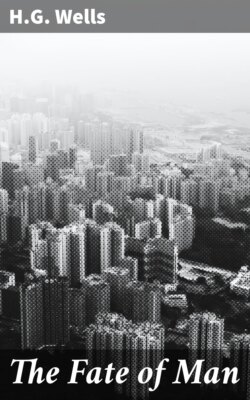Читать книгу The Fate of Man - H.G. Wells - Страница 5
На сайте Литреса книга снята с продажи.
§ 2. — BIOLOGY INVADES HISTORY
ОглавлениеTable of Contents
ONE of the most striking differences between the outlook of our grandparents and that of a modern intelligence today is the modification of time values that has occurred.
By the measure of our knowledge their time-scale was extremely shallow. They had scarcely any historical perspective at all. They looked back to a past of a few thousand years and at the very beginning of time as they conceived it, they saw human life very much as it is now: it was a more or less balanced system of certain social types: rulers and ruled, hunter and cultivator, priest and soldier. This they regarded as the immemorial life of man. They saw the life of city and cultivated land, desert and sea, throughout all the interval, spreading perhaps, changing in a few particulars, enriched rather than altered by inventions and discoveries, but essentially the same. Their range of observation and comparison was too limited for them to realize that by clearing forests, overstocking grasslands, destroying soil, they were slowly impoverishing and devastating many of the regions into which they spread. They did not connect the rise and fall of empires with a factor of unforeseeing waste in that normal life of theirs. They ascribed such drifting of population and energy as they observed to other causes. These processes of primitive waste were too relatively slow to be perceptible from lifetime to lifetime. So these thinkers of yesterday talked of unchanging human nature. You cannot change human nature, they said. They relied upon the fabled promise of the rainbow, they had it straight from the Creator's mouth, that while the earth still remained, seedtime and harvest should endure.
The order of events seemed a sure, unfailing routine. And in much the same way, our ancestors, until a couple of dozen centuries ago, thought the world was flat. They thought the sea they sailed upon flat without qualification, and it required a considerable amount of mental exercise for them to realize that the apparent plane of the ocean surface was really curved and that the faster and farther they sailed the more effectively they would realize how the round earth was falling away from their first assumptions. All their old landmarks would then vanish one after another. Astounded navigators found unfamiliar constellations in the heavens. Within two dozen centuries man has been discovering that he lives not on a flat earth but upon a globe, and within the last ten, that he is not the center of the universe but a denizen of a very second-rate planet. He has had to readjust his general ideas about life to that, and to a certain extent he has adjusted them. To a certain extent only.
And similarly our historical imaginations, quite as much as our geographical imaginations, live today in a vastly enlarged system of perspectives. We know that the everlasting hills are not everlasting, that all our working conceptions of behavior and destiny are provisional and that human nature and everything about it is being carried along upon an irreversible process of change. Our historical ideas reach back now through vistas of millions of years, we see humanity emerging from sub-human conditions, from the life of relatively solitary apes, at distances in the nature of a quarter of a million years, we know with increasing precision of the onset of a social hunting life in those distant ages, we are able to trace the beginnings of agriculture in a period of two or three hundred centuries, and by the new scale, the development of cities, language, law, religious organization, and all the various adaptations of humanity to the new conditions of a regular food supply, all that social system which seemed as eternal as the heavens, appear now events of yesterday, devoid of any finality whatsoever. That fixity of the normal human life which our great-great-grandfathers assumed as a matter of plain common sense, we discover was a transient dream. As our perspectives open, it vanishes.
The rapid progress of social psychology, human ecology and all the ill- defined activities of human and general biology is opening our eyes, it is opening even the eyes of our trained historians and our social teachers, to the real nature of our everyday social life. It is brought home to us that the human species for the last twenty or twenty-five thousand years has been living in such a continuously accelerating process of change as no other animal species has ever been called upon to face. And it is also being forced upon our reluctant attention that the species Homo sapiens is no privileged exception to the general conditions that determine the destinies of other living species. It prospers or suffers under the same laws. These laws can be stated compactly, and there is nowadays very little dispute about them, even in matters of detail.
